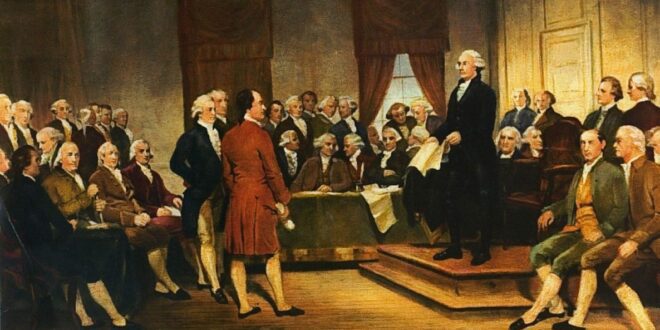The recent controversial Supreme Court decisions have led many people to question how we ended up in this situation. However, the truth is that we have faced similar debates and conflicts throughout our history. Nearly 250 years ago, the Founders were grappling with the same issues we face today – concerns over government overreach, individual freedoms, and the powers of the presidency. But their primary focus was on the fundamental questions of who should hold power, whether it was right for them to have that power, and how different power structures, such as federal courts, could coexist with states, executive authorities, and legislatures. These questions continue to linger and have a significant impact on contentious issues such as abortion access, gay marriage, and privacy rights.
Ultimately, the Founders made a conscious decision to limit the power of the federal government, and this sentiment is reflected in the text of the Constitution. However, they understood that the text alone would not be enough to prevent far-fetched interpretations of the Constitution that expanded federal power at the expense of state sovereignty. The Anti-Federalists, who opposed the ratification of the Constitution, accurately predicted this outcome. They recognized that the system of federalism, which limited the federal government to national issues and allowed the states to govern almost everything else, was necessary to preserve the autonomy of the states. As Charles Krauthammer astutely asked, why should the norms of a vast and diverse nation be reflected in the decisions of just nine appointed lawyers from three law schools?
The principles of federalism and the separation of powers, with their equally powerful legislative, executive, and judicial branches, were the linchpin of the Founders’ framework. By dividing government power, they sought to protect the principles they held dear while creating a sense of unity in foreign affairs. This was crucial because, in the late 18th century, individuals considered themselves citizens of their respective states rather than the Union. State autonomy often clashed with national treaties and created competition among states. It was clear that this situation was unsustainable for a united United States.
To encourage the ratification of the Constitution, John Jay, Alexander Hamilton, and James Madison wrote a series of essays known as the Federalist Papers. In these essays, they argued in favor of a strong federal government. However, the Anti-Federalists, writing under the pseudonym Brutus, viewed the struggle for power as the very essence of government. They predicted that over time, the federal government would inevitably seek more power, rendering the paper protections of the Constitution insufficient. Brutus even envisaged a future where the powers of the legislature extended to every aspect of citizens’ lives, no matter how trivial. Unfortunately, time has proven the Anti-Federalists right, particularly when it comes to the actions of the Supreme Court.
A prime example of federal overreach is the case of Wickard v. Filburn in 1942 during the Great Depression. Congress had passed the Agricultural Adjustment Act of 1938, which restricted the amount of wheat farmers could grow. Roscoe Filburn was fined for growing more wheat than allowed by the Act. When he appealed the fine to the Supreme Court, he lost. The Court ruled that Congress had the constitutional authority to regulate Filburn’s actions under the Commerce Clause, as his wheat cultivation could potentially impact interstate sales of bread. This interpretation of the Commerce Clause allowed the federal government to regulate almost everything that affected interstate commerce, even if the person involved did not engage in commerce themselves. This ruling is an example of the constitutional system failing to protect states’ rights, as the Anti-Federalists had warned.
In another case, Kennedy v. Louisiana in 2008, the Supreme Court held that it was unconstitutional to apply the death penalty to child rapists who did not intend to kill their victims. They argued that this punishment violated the Eighth Amendment’s prohibition of cruel and unusual punishment, based on their interpretation of evolving standards of decency and their own judgment. However, the Constitution does not explicitly limit the death penalty to certain offenses that conform to evolving standards of decency. The decision to impose the death penalty is left to the states, not the federal government or the Supreme Court. This case highlights the issue of unelected judges assuming the role of arbiters of evolving social norms, a power that was never intended for them.
Additionally, the Anti-Federalists predicted the disparity that would develop between state and federal courts. They believed that over time, federal courts would overshadow state courts in terms of dignity and respectability. This prediction has become a reality, as state courts are often considered less significant than their federal counterparts. This is, in part, due to variations in how judges are selected – some are elected, others appointed. Federal judges, on the other hand, are appointed by the President and confirmed by the Senate. This process creates an elitism within the federal courts, making them more prestigious than state courts. State courts handle a wide range of everyday issues that impact people’s lives, while federal courts are primarily involved in high-level cases.
Reflecting on the predictions of the Anti-Federalists, it is clear that their concerns were justified. They foresaw the dangers of institutions disregarding the letter of the Constitution and the encroachment on states’ rights. Through creative interpretations of the Commerce Clause, we have witnessed significant federal overreach. Furthermore, the prestige of state courts has been diluted, while federal courts have become more powerful and revered. These trends can be attributed to the inherent desire of individuals to amass power. It is crucial that we recognize and address these issues to preserve the principles of federalism and protect individual liberties. Hindsight may be 20/20, but it is never too late to correct course and safeguard the rights and autonomy of states.
 Mind Uncharted Explore. Discover. Learn.
Mind Uncharted Explore. Discover. Learn.
